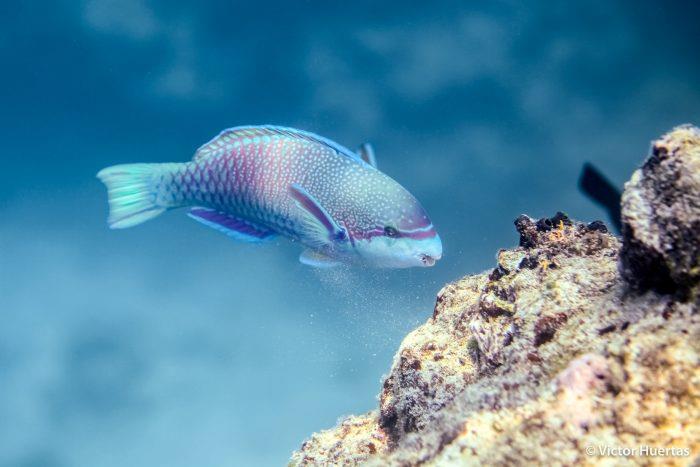
Severe coral loss leaves reefs with larger fish, but at a cost
by Davy Falkner 12 May 2020 07:10 UTC

A Scarus globiceps scraping algae off a reef © Victor Huertas
New research on the Great Barrier Reef associates severe coral loss with substantial increases in the size of large, long-living herbivorous fish. However, the ecosystem is also left vulnerable to crashing.
In research published in the British Ecological Society journal Functional Ecology, an international team of researchers compared reef surveys from 2003-2004 and 2018. They found severe coral loss—up to 83% in some areas—was associated with increases in fish biomass, productivity and consumed biomass. This means the reef currently has more energy stored in the form of fish weight, is able produce more fish weight, and these fish are being consumed by predators.
Lead author Renato Morais, a PhD candidate from the ARC Centre of Excellence for Coral Reef Studies at James Cook University, said "It's as if the herbivorous fish community has been scaled up, with larger fish growing and providing more food for predators when they die."
However, he warns this comes at a cost.
Superficially, the presence of bigger fish after a coral reef collapse suggests a stable population. But the researchers warn that reduced turnover, or recycling of biomass, means this feature might not last long.
"The fish have not multiplied," Mr Morais said. "Instead, there are more bigger fish and less smaller ones."
"This suggests that many of these long-living herbivorous fishes, such as surgeon fish which can live up to 40 years, could have been there before the corals died, only growing bigger. Eventually, these older fish will die and, if not replaced by young ones, productivity could collapse."
The increased growth of large fish like surgeonfish, parrotfish and rabbitfish is likely to have been made possible by the accessibility and quality of algal turf, the preferred food of these herbivores. These algal 'lawns' grow abundantly over the skeletons of dead coral. A recovery of the coral could result in a reduction in this food source and collapse of these herbivores.
Erosion of dead coral structures and subsequent loss of refuges for fish could also cause a population crash. Although the researchers did observe a decline in coral structure in the reef area studied, it is possible that it had not reached a level where fish biomass would start to decline.
Between 2014 and 2017 the reefs around Lizard Island, where the research took place, were subjected to two back-to-back mass bleaching events and two severe cyclones that decimated the coral populations. Combined, these events led to an 80 percent decline in coral cover throughout the area.
Previous research has mainly taken a static look at the impacts of coral loss on fish. But in this study the researchers looked at the cumulative effects of coral mortality over time using metrics often absent from coral reef studies: fish growth, mortality and energy turnover.
The researchers are now looking to follow any new energetic shifts.
"Will there be a recovery of corals? Or will this degraded state be maintained?" Mr Morais said.
"Then, will these large and old herbivorous fishes be replaced by younger ones?"
"There are many aspects in this story to be investigated."
Paper: Morais R, Depczynski M, Fulton C, Marnane M, Narvaez P, Huertas V, Brandl S, Bellwood D. (2020). Functional Ecology. 'Severe coral loss shifts energetic dynamics on a coral reef'. DOI: 10.1111/1365-2435.13568.
Video here.